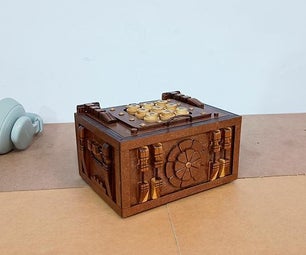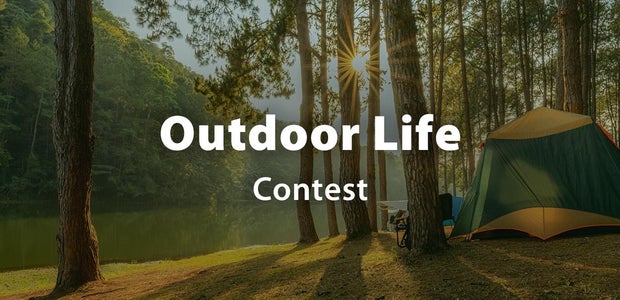Introduction: How to Live the Off Grid Dream
"How to Live the Off Grid Dream"
In less than 147 steps!
So, Living the Off Grid Dream, who is this for anyway? This might be for you! Do any of these sound interesting to you?
You want to unplug, slow down and live a simpler life. You want to reduce your expenses. You want to travel, maybe you like camping, or the RV Lifestyle. You like living far from your neighbors!
And, maybe you want to invest in your future, meaning you spend the money, time, energy now to build a place you can retire to later, that would have much lower monthly expenses. That's kind of how I got started.
I've been living off grid, on my own property for over 2 years now. Its not for everyone, and its not always easy, but I've done it, and maybe you can too?
How can I do this?
By following this simple 147 step process, you can live this off grid dream lifestyle!
Step 1: Adventures and Background
But rather than hitting you with all 147 steps right away, lets make it simpler for you. We can divide this into 2 main steps, Shelter, and Utilities.
Before that, though, maybe you'd like to know a little bit about me. What makes me someone you can believe, right?
Some of my adventures, for example. I took a year off of work, sold my car, jumped on a motorcycle, and went exploring. In the process, I went from Canada, to Alaska and the Yukon, and then eventually moved to Texas, still on the motorcycle.
More recently I did some "truck camping" at work, during the week, to cut down on driving from my ranch to my job, which was about 100 miles away. I slept in the parking lot at work, then would go to the gym for showers, cooked oatmeal on my tailgate, and then got a couple hours of quality wifi time at the local library. I came home on weekends. That saved a fortune in gas and driving!
And here on the ranch, I've lived in an old school bus for 2 years. This summer I built a small house to live in, but I still have the bus, which I'll use for storage, and probably convert part of it for an office.
So, what does "Off Grid" mean, really?
Basically, you are not connected to utilities, no power, no water, no sewer, no cable TV, no internet. No Fun? Hard to imagine right? You may have one or several that you can connect to, though. Maybe there is phone service, but no power.
For the utilities you do not have, you decide, which ones do you need? Maybe you don't need Cable TV?
Water is pretty important, and most of us can't live comfortably without electricity.
But maybe the best place to start is with basic shelter. If you've ever gone camping, you know what I mean. Having a tent and a sleeping bag makes life a lot easier.
For the motorcycle trip, everything I needed was on the motorcycle. * Camping Gear * Sleeping Bag * Tent * Air Mattress * Tools and Spare Parts * Laptop, Digital Camera, Video Camera, Action Camera * Solar Panel, batteries, and Inverter to charge cameras and laptop * GPS and Cell Phone powered by the motorcycle
In truth, I packed way too much stuff. If you see the pictures, you'll see what I mean! The cameras, lenses, batteries, chargers, etc took up a lot of space. Now you could probably just take a cell phone and a GoPro and be set!
That trip really changed my life. Every time I paid an elecric bill after that, I remembered life on the motorcycle. That had planted the seed in my head, or in my heart, that there was probably a better way to live.
I wanted to disconnect from the grid. Or more importantly, I didn't want to pay for the grid anymore!
In the last 2 years, I have not had an electric bill, which is pretty awesome!
Step 2: This Won't Be Easy, But It's Worth It!
However, the Off Grid Life isn't easy. In fact, every single part of it is harder than just living in an apartment.
I do not have water service, and I live in the desert. It does not rain very often. The nearest town is about 15 miles from my little ranch, I drive there every week or two, with a water tank in my truck, to haul water for doing laundry, taking showers, and drinking.
I have a generator for power, and then more recently I started using solar panels. Next, since the wind blows pretty often here, I'd like to add a wind power generator to the system.
OK, that's what I have. You'll probably do it differently.
Like camping, you need shelter, some place to sleep or live.
I'll give you a range of options to get you thinking, alright?
If you were truly homeless, a piece of plastic or a big cardboard box would give you some shelter.
If you like camping, maybe you'd have a tent and a sleeping bag.
If you have a car, you can sleep in the car. It might not be comfortable but you'd be pretty happy not to be sleeping in the cardboard box, right?
Plus with a car, you can store your extra stuff in the car, and its secure. You can lock the car. If you've ever traveled without a car, you start to realize how much of a liability all your stuff is. You can't let go of your backpack, or it'll get lost or stolen. So being able to lock something in the car is a great option.
Moving up scale, if you had a van or motorhome, or a RV trailer, you'd have a much more comfortable time. You can get up and move around. You're not sleeping on the ground.
Not everyone who is going off grid will have property to live on.
You always hear about the people who retire, sell their house, and hit the road in a RV. What a life! That would be wonderful! You could go from park to park, state to state, exploring. So you wouldn't need to have land of your own. Just keep the wheels rolling!
If you were between jobs or whatever, you might find yourself in your car camping at the WalMart. Not quite as glamorous as the RV, but better than the cardboard box!
Camping at campsites is nice, there might be restrooms, showers, camp fires, maybe even wood available! Depending on the part of the country, and even the season, you may be able to get long term camping.
Ok, so you could live in a box, or wrap up in a tarp or piece of plastic. You can car camp at WalMart. A truck camper, or trailer, or RV gives you more room to live. Plus they have plumbing, showers, and appliances.
So that takes care of basic shelter.
Step 3: Where Do You Want to Live?
Where do you want to live?
The WalMart parking lot isn't a long term solution, right? If you have the resources, you could just hit the road and explore.
But what if you want a home base, some place to park of your own, or a place to come back to between trips?
This is where it gets interesting.
Land is everywhere. Some places are very expensive, and others are amazingly inexpensive. For example, undeveloped land like mine was priced about $500 an acre, in 20 acre parcels.
Undeveloped land? This is an old cattle ranch. There is a county road running across the front of my parcel. There is county electricity available, but no water, sewer, gas, or telephone service.
I've heard of people buying land unseen, and later finding out the land has no road to it at all, its completely unaccessible, so it would be worth your time to do some research, maybe make arrangements to go see your property before you sign any contracts.
Building codes are also important to know. Some people out here are just living in RV Trailers, there's an old Army tent, some manufactured homes, some Tiny Homes, and a few storage shed type buildings that people are living in.
I'm not even the only school bus out here!
After you figure out shelter, you can start thinking about utilities.
Step 4: Utilities - When You Don't Have Them, You Can Make Your Own!
Electricity
Solar is common, but has its limitations, and can get pretty expensive.
Gas powered generators are really simple, just check the oil, add gas, and start it up.
Wind generators are really awesome, if you live where you have strong winds.
Solar, Generator, and Wind, combined would be a great plan.
Solar and wind systems will need a battery bank to save the power for when you need it. If you also have a generator, you may not want to run it all the time. Its nice to have as a back up, for example to do laundry. Whenever the generator is running, I'm also running a charger to top off the batteries. Batteries mean I can do things without the constant noise, and expense, of running the generator.
In the first few months of living in the school bus, I used a lot of flashlights for lighting. As I had time, I set up more 12V DC lighting, which could run right from the main batteries. Think like in your car, when you open the door, the dome lights come on. The bus also has dome lights, so I wired that circuit to my solar battery bank.
For AC power, like running your electric fans, coffee maker, and laptops, regular "house wall power", you can convert from the DC power in your batteries, to AC power. That is done with a device called an Inverter. For a nice quiet evening, its nice to be able to run some loads from the battery bank.
You can also just run the generator, it puts out AC power, just run a cord from the generator to your coffee maker, and you're set.
For my typical day, I can run most of the electrical loads from power stored in the battery bank. I can charge laptops and cell phones. I can run my deep freeze 4 hours a day. I can make coffee. I can even run some power tools from solar. The question is how much of each! If its cloudy, you don't get as much solar power. You might not be able to make coffee, run the deep freeze, and run the table saw at the same time. Living off grid does take some getting used to!
That's where the Generator is really handy. Start the Generator, then do your big loads. I always try to take advantage of the Generator, like when I'm doing laundry anyway, I might brew coffee, run the deep freeze, and charge all the power tool batteries, plus top off the main batteries. Its running anyway, why not right?
Some numbers to put it in perspective. You can get a cheap generator for $300-$500. That can power any one or two of your devices at the same time. Mine is rated at 4,000 watts, but 3,000 watts contineously. It can run the electric dryer, but only on air fluff. I also have a 9,000 generator that cost a lot more, that can dry clothes. I can probably run everything at the same time on the big generator.
Step 5: Technical Stuff and Conclusion
Technical stuff if you're interested, if not, skip this part!
My solar system consists of 4 Harbor Freight 100 watt kits, so that's 16 panels (rated at 25 watts each), for 400 watts total. That is wired into a 3rd party charge controller, that then feeds 4 marine / rv style deep cycle batteries. The power from those batteries can run my DC water pump directly, for taking showers, also some 12V lighting. Everything else I'm running on AC power, from a 1500 watt inverter.
The cost of solar panels, batteries, inverter, and charge controller is over $1000 at the moment. Plus the generator cost $400 (think one was on sale for $300), I wore out one generator, because in the beginning I didn't have the solar, so I ran the generator quite a bit. Then I bought the big generator for doing laundry, also for welding.
Water I have a water tank for my truck, to haul water from town, and then I transfer that to a larger tank, that is connected to my plumbing. There is an electrical pump that sends the water to the shower and for doing laundry.
Tanks can cost about $1 per gallon, rough numbers. The truck tank was 200 gallons for about $300. The storage tank was 275 gallons for about $250. If you go bigger, it gets better, though. I looked at some 1000 gallon tanks that were about $750 if I remember correctly.
I typically use about 100 gallons per week, showers are short, I drink lots of coffee and lemonade, and do laundry once a week or so. Most of the water is used doing laundry.
If it rains, I do have some rain gutters, and on a wet year I can use that quite a bit. Last year I was able to catch enough water from rain, off the roof, that I did laundry and showers for 2 or 3 months.
I did still haul drinking water, but I don't feel bad about drinking rain water. The issue is storage. At this point I am not able to store enough of the rain water in clean tanks, to feel good about drinking it. I have rain gutters running into trash cans, which is simple, and effective. From there, I can pump the water into the washing machine directly for doing laundry, or filter it and pump it into my main water tank, for showers, etc.
When I'm writing this, I'm torn between too many details, and trying to give a fair idea of what is involved.
I grew up on a farm, where we were connected to local power utilities, but we had to haul drinking water, so I'm kind of used to it.
There's a lot of people who don't know anything about living off grid. Some people think its weird, some people think its like a competition, you have to be really hard core about it.
I remember years ago, thinking I'd like a cabin in the woods or something. But I still like things to work, too! Now you can kind of have the best of both worlds. My cell phone works out here, sometimes! I have laptops that are charged from solar power. I can take a shower, do laundry, and run power tools.
The difference is, I have to make sure I actually have water before I take a shower. And do I have gas to run the generator on a cloudy day? If nothing else, I don't worry too much about if the power goes out, because I know how to make my own!
I hope this was as fun for you as it was for me!
In the last 2 years I've made lots of videos, over on YouTube, feel free to check them out! https://www.youtube.com/user/CarlinComm/videos
Bye for now!
Carlin







